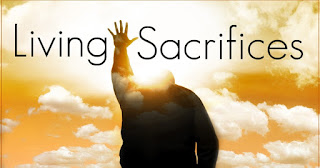What We Have Seen
It's tough to talk about what you haven't experienced—what you haven't seen, or touched, or heard. I can look at pictures of the Golden Gate Bridge, and I could even look up specs online and maybe describe it to someone, but I've never been there. I've never actually seen it, and so all I'm left with are second-hand reports. However, ask me about the U. S. Capitol Building, and because we were there just this past summer, I can tell you what it's like to stand inside the Rotunda, as well as what the Senate and House Chambers are like. I can tell you how it feels to be there, surrounded by the weight of history. I can tell you that because I've been there.
I remember the first time I was able to travel to Austria. It was in 2000, and I had gone there with a group to see the famous Oberammergau Passion Play. As we pulled into our inn in the small village of Matrei, I made a rather silly comment to my parents: "It looks just like the pictures!" Well, what can I say? I was overwhelmed with the beauty of the place. I had heard about it, but to actually experience that culture was something entirely different.
And so, as we turn to John's letters near the end of the New Testament (a place we're going to marinate for a few weeks), it's important to remember this fact about John (traditionally the disciple whom Jesus loved, one who walked with him): he was there. He reminds us in the very first few lines that he was one who had experienced Jesus first-hand. "We proclaim to you what we have seen and heard, so that you also may have fellowship with us" (1 John 1:3). John was not telling these first-century readers about something he had only heard about in passing. He was determined to share what he had learned and the one he had experienced first-hand. He had been there. He knew Jesus.
I remember the first time I was able to travel to Austria. It was in 2000, and I had gone there with a group to see the famous Oberammergau Passion Play. As we pulled into our inn in the small village of Matrei, I made a rather silly comment to my parents: "It looks just like the pictures!" Well, what can I say? I was overwhelmed with the beauty of the place. I had heard about it, but to actually experience that culture was something entirely different.
And so, as we turn to John's letters near the end of the New Testament (a place we're going to marinate for a few weeks), it's important to remember this fact about John (traditionally the disciple whom Jesus loved, one who walked with him): he was there. He reminds us in the very first few lines that he was one who had experienced Jesus first-hand. "We proclaim to you what we have seen and heard, so that you also may have fellowship with us" (1 John 1:3). John was not telling these first-century readers about something he had only heard about in passing. He was determined to share what he had learned and the one he had experienced first-hand. He had been there. He knew Jesus.
We who live two thousand years removed from that time, though, may wonder what we have to contribute. We weren't there. Yet, the miracle of the work of the Holy Spirit is that even though Jesus is no longer physically present with us, we still can experience his presence. We can know him with us. The Spirit allows us to experience Jesus, not in the same way John did, to be sure, but still very present, walking with us each and every day. His word guides us as we read the Scriptures. His spirit enlivens us as we worship in community. His sacrifice humbles us as we gaze at the cross. He is with us.
But here's the point: do we do what John did? Do we share what we know? Do we share what we experience? Research indicates most Christians today only share their faith maybe once in their lifetime. We believe it's important, but we don't do it. That's staggering! We have experienced the very savior of the world—why aren't we sharing that with others?
Well, there may be any number of reasons we come up with and try to justify. I've probably heard them all: I don't know enough. I want to study the Bible more. I am afraid they'll ask a question I don't have the answer to, and so on. Here's what I say so very often: do what John did. You don't have to have a brilliant theological treatise to share. You don't have to know all the answers. You only have to give witness to what you know. Share your story. People can argue with and dismantle your arguments and your brilliant theological viewpoints. What they can't dismiss is the way Jesus has changed you. They can't argue with your story.
John proclaimed what he had experienced of Jesus. May you do the same today, through your life and through your words. In all things and in all ways, offer Jesus.



Comments
Post a Comment